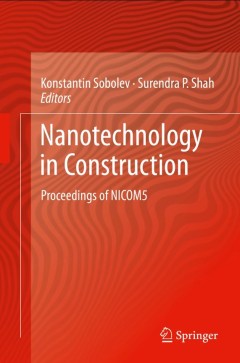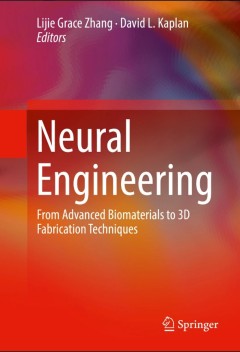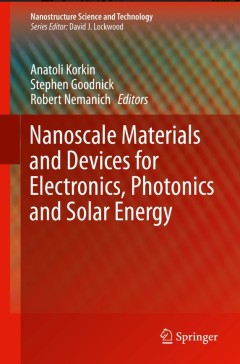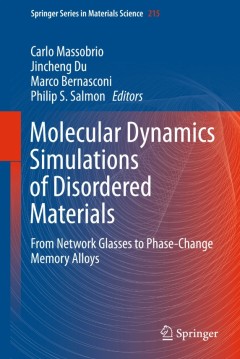Filter by

Nanotechnology in Construction
Nanotechnology has already demonstrated surprising potential for improving the performance of construction materials and many of these recent developments were facilitated by NICOM symposia. The NICOM5 proceedings will cover the emerging opportunities and future use of nanotechnology in construction and will illustrate the broad potential for application of nanotechnology to challenging problem…
- Edition
- 1
- ISBN/ISSN
- 978-3-319-17087-9
- Collation
- XV, 509
- Series Title
- -
- Call Number
- -

Encyclopedia of Microfluidics and Nanofluidics
Covering all aspects of transport phenomena on the nano- and micro-scale, the 800 entries include 300 essay entries. The Encyclopedia gives an up to date look at the fundamentals of the field as well as many experiments and applications in growing areas such as energy devices and bioengineering applications.
- Edition
- -
- ISBN/ISSN
- 978-1-4614-5491-5
- Collation
- 1050 b/w illustrations, 1150 illustrations in colour
- Series Title
- -
- Call Number
- -

Organic-Inorganic Hybrid Nanomaterials
Advances in Polymer Science enjoys a longstanding tradition and good reputation in its community. Each volume is dedicated to a current topic, and each review critically surveys one aspect of that topic, to place it within the context of the volume. The volumes typically summarize the significant developments of the last 5 to 10 years and discuss them critically, presenting selected examples, e…
- Edition
- -
- ISBN/ISSN
- 978-3-319-13593-9
- Collation
- -
- Series Title
- Advances in Polymer Science
- Call Number
- 620.115 ORG

Nanoporous Metals for Advanced Energy Technologies
This book covers the state-of-the-art research in nanoporous metals for potential applications in advanced energy fields, including proton exchange membrane fuel cells, Li batteries (Li ion, Li-S, and Li-O2), and supercapacitors. The related structural design and performance of nanoporous metals as well as possible mechanisms and challenges are fully addressed. The formation mechanisms of nanop…
- Edition
- 1
- ISBN/ISSN
- 978-3-319-80643-3
- Collation
- XIV, 223
- Series Title
- -
- Call Number
- -

Neural Engineering:From Advanced Biomaterials to 3D Fabrication Techniques
This book covers the principles of advanced 3D fabrication techniques, stem cells and biomaterials for neural engineering. Renowned contributors cover topics such as neural tissue regeneration, peripheral and central nervous system repair, brain-machine interfaces and in vitro nervous system modeling. Within these areas, focus remains on exciting and emerging technologies such as highly develop…
- Edition
- 1
- ISBN/ISSN
- 978-3-319-31431-0
- Collation
- VIII, 306
- Series Title
- -
- Call Number
- -

Nanoscale Materials and Devices for Electronics, Photonics and Solar Energy
This book presents research dedicated to solving scientific and technological problems in many areas of electronics, photonics and renewable energy. Progress in information and renewable energy technologies requires miniaturization of devices and reduction of costs, energy and material consumption. The latest generation of electronic devices is now approaching nanometer scale dimensions; new ma…
- Edition
- 1
- ISBN/ISSN
- 978-3-319-18632-0
- Collation
- XII, 282
- Series Title
- Nanostructure Science and Technology
- Call Number
- -

Natural Fibres: Advances in Science and Technology Towards Industrial Applica…
This book collects selected high quality articles submitted to the 2nd International Conference on Natural Fibers (ICNF2015). A wide range of topics is covered related to various aspects of natural fibres such as agriculture, extraction and processing, surface modification and functionalization, advanced structures, nano fibres, composites and nanocomposites, design and product development, app…
- Edition
- 1
- ISBN/ISSN
- 978-94-017-7513-7
- Collation
- XI, 456
- Series Title
- RILEM Bookseries
- Call Number
- -

Molecular Modeling and Multiscaling Issues for Electronic Material Applications
This book offers readers a snapshot of the progression of molecular modeling in the electronics industry and how molecular modeling is currently being used to understand materials to solve relevant issues in this field. The reader is introduced to the evolving role of molecular modeling, especially seen from the perspective of the IEEE community and modeling in electronics. This book also cover…
- Edition
- 1
- ISBN/ISSN
- 978-3-319-12861-0
- Collation
- X, 194
- Series Title
- -
- Call Number
- -

Molecular Dynamics Simulations of Disordered Materials
This book is a unique reference work in the area of atomic-scale simulation of glasses. For the first time, a highly selected panel of about 20 researchers provides, in a single book, their views, methodologies and applications on the use of molecular dynamics as a tool to describe glassy materials. The book covers a wide range of systems covering "traditional" network glasses, such as chalcoge…
- Edition
- 1
- ISBN/ISSN
- 978-3-319-15674-3
- Collation
- XIX, 529
- Series Title
- Springer Series in Materials Science
- Call Number
- -

Elements of Plasma Technology
This book presents some fundamental aspects of plasma technology that are important for beginners interested to start research in the area of plasma technology. These include the properties of plasma, methods of plasma generation and basic plasma diagnostic techniques. It also discusses several low cost plasma devices, including pulsed plasma sources such as plasma focus, pulsed capillary disch…
- Edition
- 1
- ISBN/ISSN
- 978-981-10-0117-8
- Collation
- 12 b/w illustrations, 93 illustrations in colour
- Series Title
- -
- Call Number
- -
 Computer Science, Information & General Works
Computer Science, Information & General Works  Philosophy & Psychology
Philosophy & Psychology  Religion
Religion  Social Sciences
Social Sciences  Language
Language  Pure Science
Pure Science  Applied Sciences
Applied Sciences  Art & Recreation
Art & Recreation  Literature
Literature  History & Geography
History & Geography